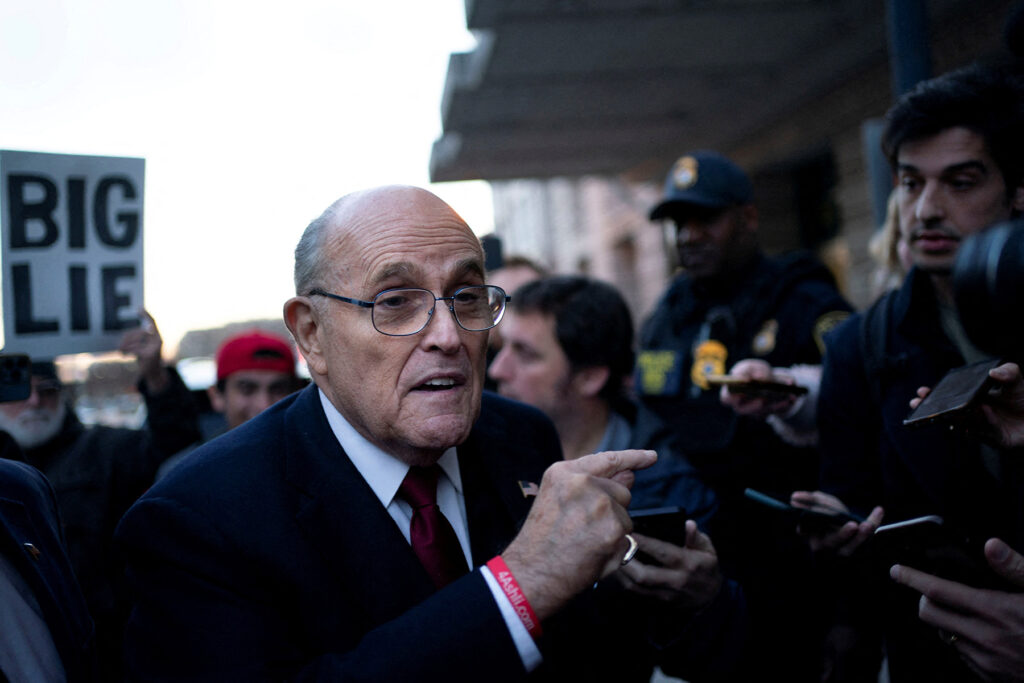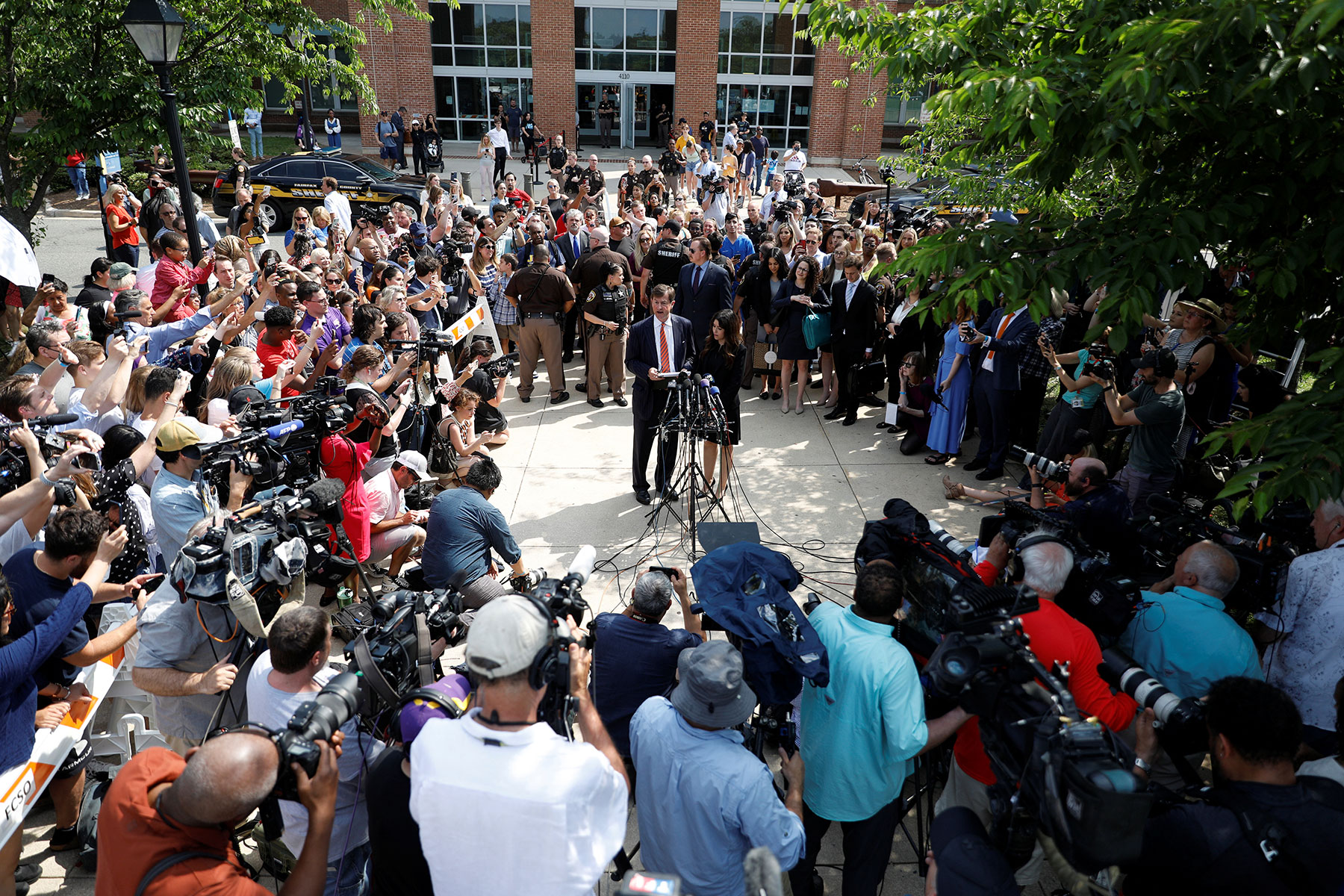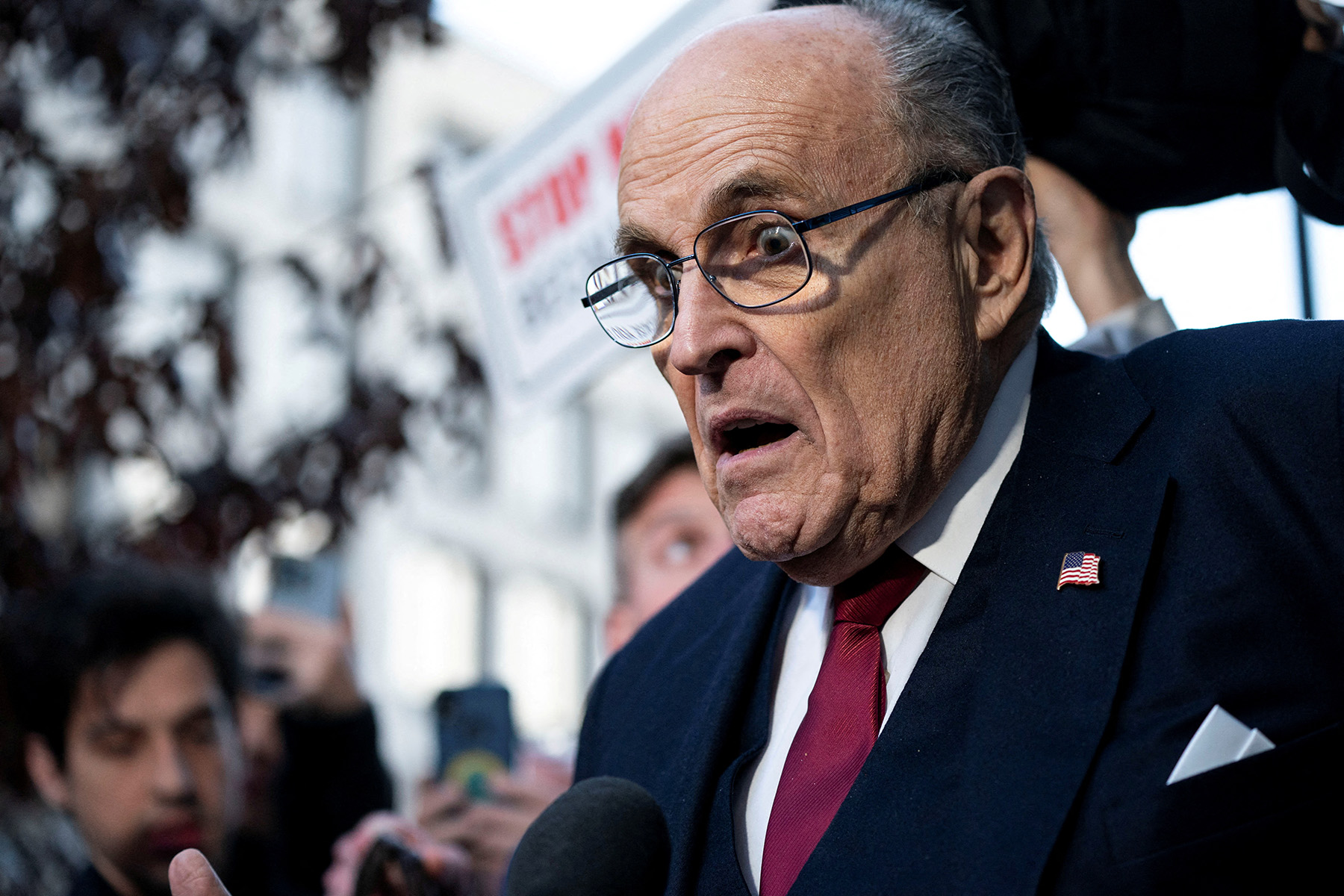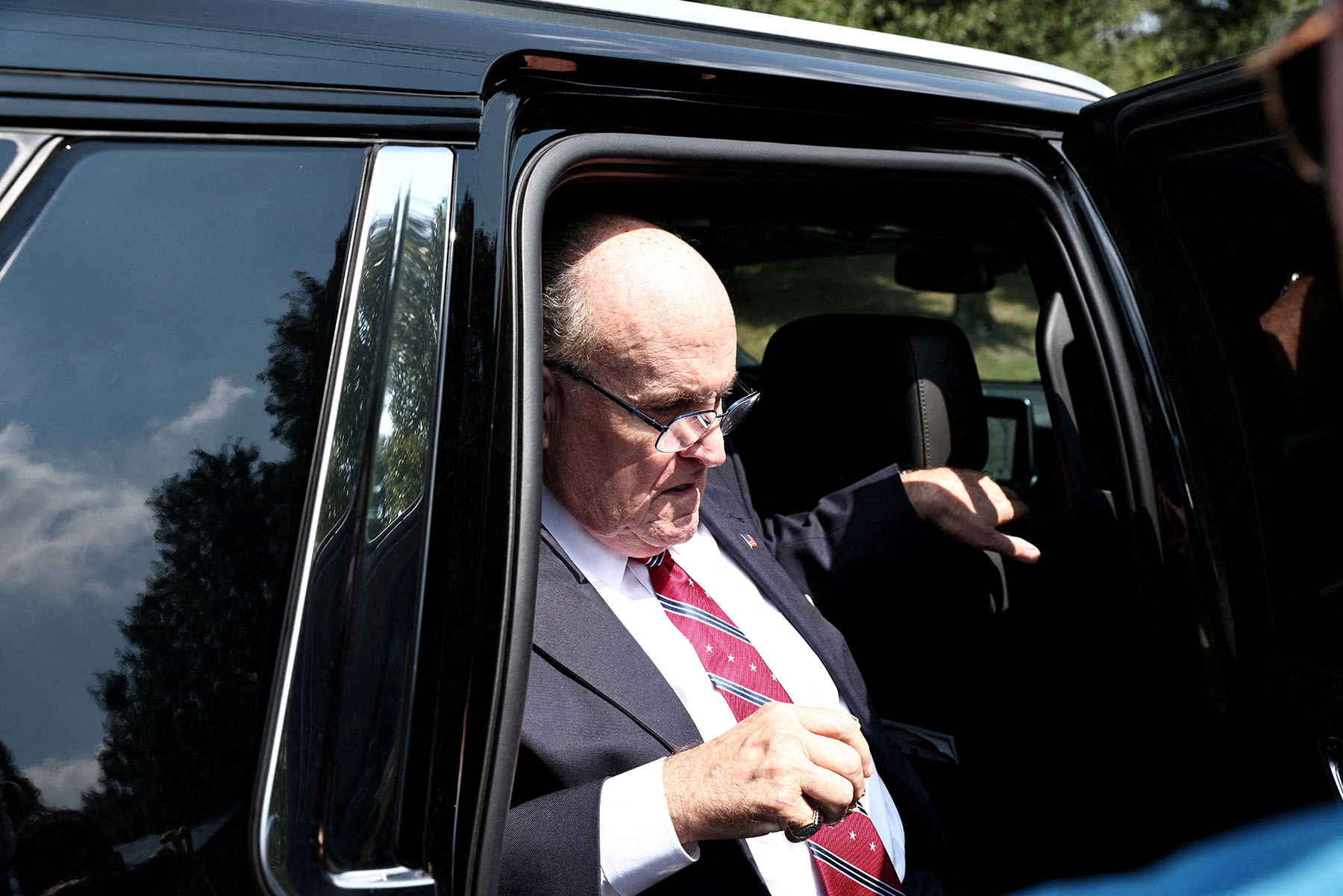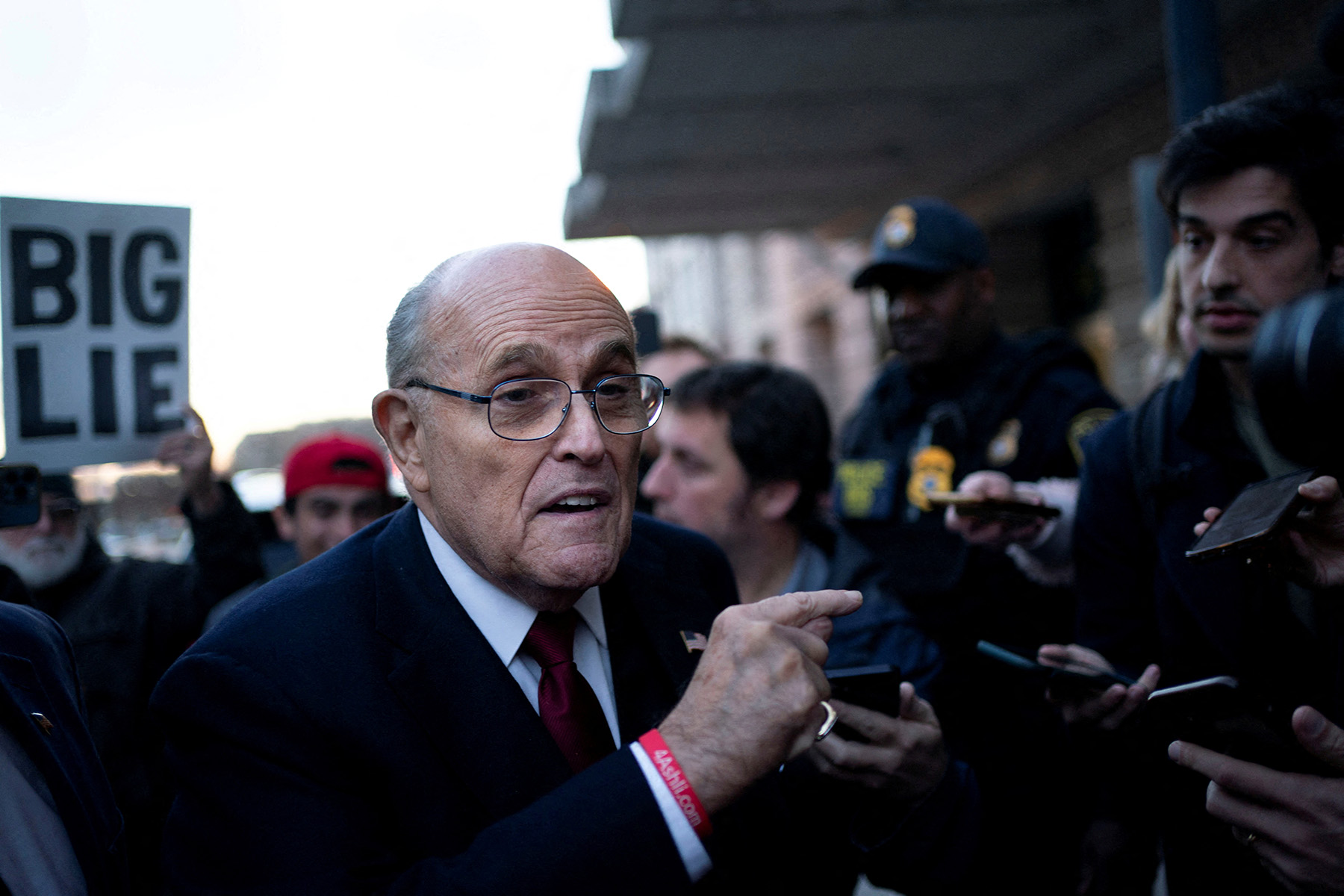Attorneys Michael Gottlieb and Meryl Governski represented former Georgia election workers Ruby Freeman and Wandrea “Shaye” Moss in their defamation suit against Donald Trump’s former campaign attorney Rudy Giuliani — who was ordered by a jury to pay $148,169,000 in damages in December.
The women received threatening and racist messages in the wake of Giuliani’s claims that the pair rigged the state’s 2020 election results. The widespread conspiracy theory also led to an indictment of Giuliani, along with former President Donald Trump and 17 others in a separate, ongoing criminal case in Fulton County, Georgia.
Following the jury’s verdict, Freeman told reporters that she can “never move back into the house that I call home. I will always have to be careful about where I go and who I choose to share my name with. I miss my home. I miss my neighbors and I miss my name.”
Gottlieb and his legal partner Governski, a former journalist, represented the pair for free, using defamation law, a legal tool frequently wielded against the press, to fight back against political disinformation.
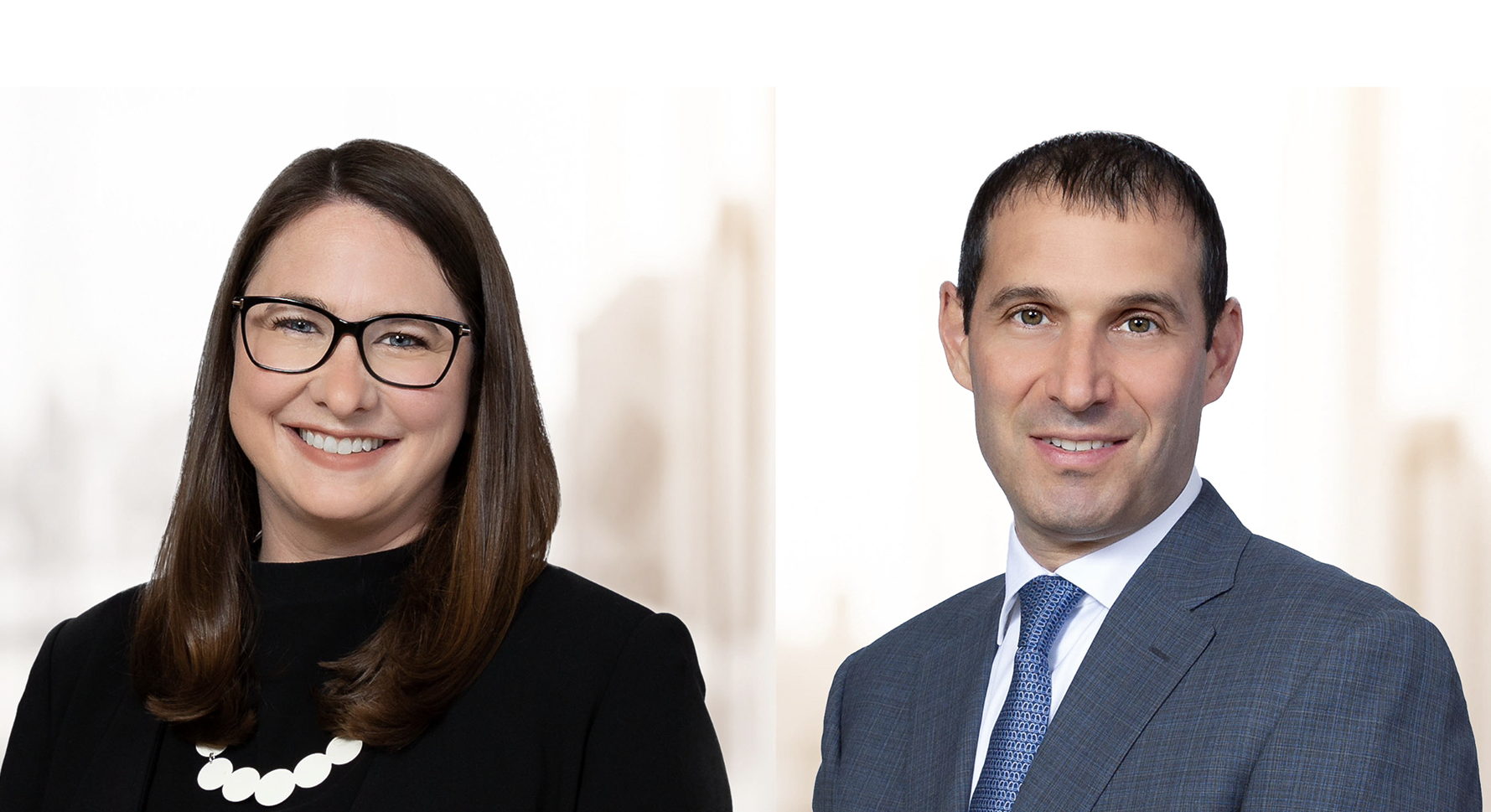
Attorneys Meryl Governski (left) and Michael Gottlieb (right). Photos courtesy of Willkie Farr & Gallagher LLP.
First Amendment Watch spoke with Gottlieb and Governski about political disinformation, the impact of social media, and the hope that large damage awards will deter future bad actors.
Editor’s note: This interview has been edited and condensed for length and clarity.
FAW: How would you define political disinformation? How do you use defamation law to fight back against it?
Gottlieb: I think there are many ways of looking at how to define disinformation. I think fundamentally, when we think about disinformation, we’re thinking about false information about individuals or events, that is deliberately, willfully spread around the informational environment, media ecosystem, or traditional media or social media, that is designed to obfuscate or confuse people in the political process. That can be the electoral process or the political or policy process. We think about the role of defamation, not as defamation sort of standing alone as a tool against political disinformation, but defamation as one cause of action among a number of causes of action that are potentially available to victims of disinformation. It’s not the only cause of action or only tool available, but it’s one, and it’s one that’s been used effectively by a number of victims of disinformation over the last half decade to try to combat the spread of disinformation. It’s a limited tool, because when you think about political disinformation a lot of times that kind of disinformation is not going to be defamatory. It’s not going to meet the doctrinal requirements of defamation. And to give you an example, having a policy debate not about a person but about whether a policy idea is a good or bad policy — talking about vaccines, talking about the general fairness of electoral procedures, talking about whether mail-in voting is a good or bad thing, talking about voter ID — those types of issues are not going to be defamatory, even if they contain deliberate false information as part of the speech, because they’re not going to be about or of and concerning a particular individual. So that’s what we think about when we think about using defamation to combat political disinformation, we’re thinking about cases in which specific individuals have been made the target of a sort of campaign of false information in the political arena. And it’s only when there’s specific individuals that have really been made the target of that kind of speech that that tort of defamation comes into play.
Governski: And one thing I think that I would add that I think is important to kind of meld the two concepts that Mike just described is that the way that we look at political disinformation is that the element of actual malice for purposes of defamation is really baked into the definition of disinformation, where this isn’t a traditional case of a reporter or an individual just getting it wrong, or making a mistake, or having even their own personal animus or motives. Really, it’s where the inaccurate information, the false information, the untrue narrative, is the point, and that it is an intentional act to spread false information in order to pursue a political outcome, rather than rely on the kind of traditional ways of advocating for a certain political viewpoint.
FAW: Is this a new strategy? What makes it different? What made it necessary?
Governski: So I think that one aspect that makes it different is the proliferation now of this type of false information and content is just at a different level than we’ve ever seen before. Before 2016, maybe a little bit before that, a lot of these fringe conspiracy theories lived in the dark web or in the dark corners of the internet or in people’s basements or chattered about quietly. And I think what’s happened over the past decade or so, is that this type of viral spread of conspiracy theories has shifted from being something whispered to something that is telegraphed with bull horns all over the internet. The combination of the increased ways to publicly communicate, coupled with really these tactics of filter bubbles and ways to tune out any information that would kind of correct or attempt to combat the spread that you can now filter all of that out, so all you see is content that reaffirms and confirms your own biases. So I think the combination of just the proliferation of this content in a more mainstream fashion and then being able to literally mute any one or any thing that combats it, I think it’s just taken it to a different level and so using defamation for kind of a more wholesale, broader type of viral attack is kind of new just because you didn’t need to use it quite in the same degree as now where literally people become known to millions and millions and millions of people in the span of seconds. It just was not like that historically before.
Gottlieb: Defamation suits predate the American Republic by centuries in English common law. And so the use of defamation to fight back against reputational harm is older than the U.S. Constitution. It predates the First Amendment. So it’s been around for a very long time. I agree with Meryl that the technological changes in how information is disseminated and spread has resulted in more of these lawsuits being filed, and then you also have some amount of abuse of defamation suits that have been filed by people that just filed lawsuits against coverage they disagree with. You see some amount of that, and those kinds of lawsuits have also been around for a long time, but it may just be because of the decentralization of media, and the fact that 50 years ago there were basically like four or five national media outlets and then a bunch of local media outlets, and so there weren’t nearly as many individuals or entities that were publishing political news in the United States, and now there are so many more and that could possibly be a factor in the amount of suits that you see.
Governski: And actually, one thing that our expert in the Freeman case testified to was how certain types of content are more deeply held and will spread more quickly, and certainly political beliefs are one of those where when people feel very strongly and deeply about a political belief or a political candidate, that type of information spreads very quickly, coupled with false information, historically, spreading faster than true information. So kind of the two of those pieces together is like a powder keg in the right circumstance to really launch really damaging political disinformation in the matter of seconds.
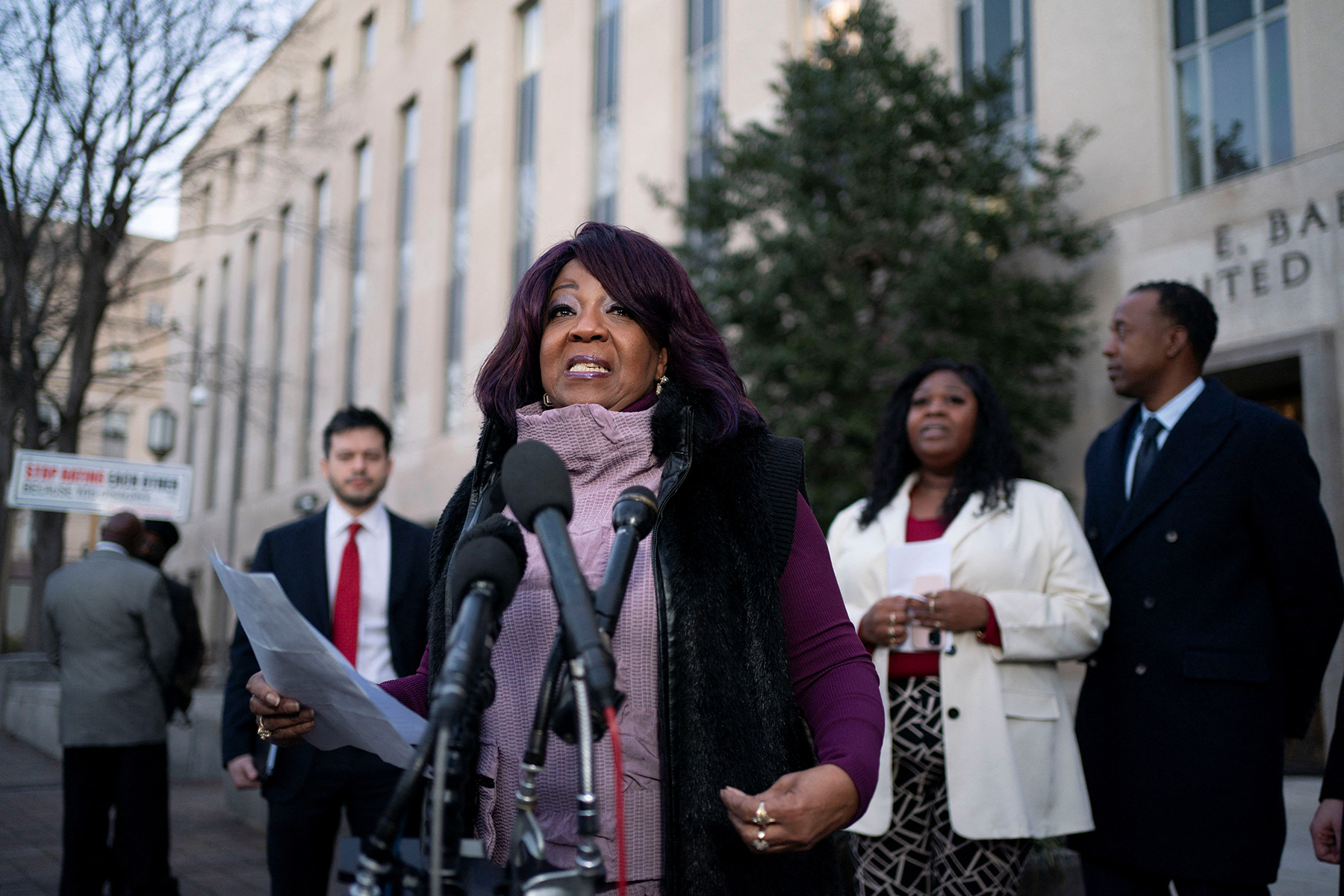
Georgia election worker Ruby Freeman Moss speaks during a press conference after a jury ordered Former New York Mayor Rudy Giuliani to pay her and her daughter, Shaye Moss, $148 million in damages outside the U.S. District Courthouse in Washington, Dec. 15, 2023. (Reuters/Bonnie Cash)
FAW: Is this strategy working? Do you think judgments against figures like Trump and Giuliani and the cases involving Alex Jones and Fox News have made other would-be spreaders of disinformation think twice about the potential legal ramifications? Is there any actual evidence?
Gottlieb: Well, I think you’ve seen specific deterrence with respect to Trump and with respect to Rudy Giuliani, in the sense that following the judgments their behavior modified in certain ways with respect to E. Jean Carroll for Trump and with respect to our clients for Rudy Giuliani. That doesn’t mean it’s a panacea or a cure all but I do think these judgments can deliver an important message that there’s a very high price to pay if you engage in this kind of sustained, deliberate, lengthy campaign to really go after a specific person I think that these different verdicts are sending a message to people that with that kind of a campaign, that there really can be some measure of accountability for that. I don’t think that means that all disinformation is going to go away or that there isn’t still going to be an incentive to tell lies about people, or to certainly not to exaggerate about people or use hyperbole or false information or political argument. I don’t think these verdicts can have that effect or will have that effect, but I do think that they are a message to people who might want to talk about a person or group of people over and over and over again, that if they are doing that with false misleading information, that there could be some accountability for them down the road. Time will tell what the effect of that is. It’s a little early to know if it makes a dent, but that would certainly be the hope, is that it does have that effect.
Governski: I also think it potentially is helping remove some types of political disinformation from more of the mainstream. You’ve seen media companies now not carrying Trump’s speeches live or cutting away from them. So I hope that it’s caused some kind of “in the middle” media outlets from taking a much more careful watchful eye for who they put on their air, and what Twitter theories they will allow to jump from the internet to TV and elsewhere. There’s always going to be the more fringe and the more radical outlets that don’t get that message. But I guess there’s a little modicum of hope that the outlets that reach many, many millions of viewers and therefore would have a larger damages number are going to take a little bit more care when deciding who to put on their shows.
FAW: Meryl, as a former journalist, do you think as a result of the verdicts in these defamation cases that are pushing back against political disinformation, that journalists have taken different considerations on how they are covering certain political or public figures?
Governski: So the types of cases that we’re talking about, that Mike and I have litigated, or of the similar ilk that have generated these large damages figures, notably large punitive damages figures, I think are the antithesis of journalism. The types of statements and the type of activity that we’re litigating is not actual journalism, and they don’t subscribe or follow any of the indicia of traditional journalists. So I think individuals who have gone to Columbia or Northwestern or these graduate programs where on the first day, you learn about all of the tenants of what responsible journalism looks like, retracting something when you get it wrong, having multiple sources for a statement, of asking every individual named for a comment, all of these just standards of journalism ethics are just not present. They’re not even a little bit present. They’re completely absent from these types of cases. So I’m not sure what legitimate skilled ethical journalist would necessarily take from these cases, except that this shows the outer boundary of what is absolutely not protected by the First Amendment, which is made up fabricated malicious speech.
FAW: What are your thoughts on the possibility of such disinformation flooding AI chatbots, and in turn, leading to defamation litigation? Do you think that since these chatbots curate information from online sources that it’s possible they could further spread political disinformation?
Gottlieb: I mean, look, it exists. It sits at the intersection of defamation, First Amendment law and the immunity that’s given to internet content providers under Section 230 of the Communications Decency Act. And there’s a host of complicated and fascinating policy questions about how do you treat content generated by an AI entity that winds up defaming an individual. Is the company that essentially unleashed the AI technology the same as a publisher of a news article, or is it something a little different than that? You’re starting to see some of that litigation already. There’s plenty of copyright litigation that’s risen up around ChatGPT associated with OpenAI. I think there’s a lot of questions that have yet to be answered or addressed by the courts, or by state or federal legislation on the issue, which I think there’s going to be a ton of movement on it and attention to it. All I can really say is it’s incredibly interesting, fast moving and will kind of pose the next generation of challenges for adapting what is truly an ancient doctrine to modern technology and modern times.
FAW: In 2016, Trump vowed to “open up” libel laws as he believed the precedent set in the Supreme Court’s 1965 decision in New York Times v. Sullivan made the standard of defamation harder to reach for public officials like himself. Do you think he will maintain the same idea if re-elected? What would this mean to your efforts to use defamation law to curtail political disinformation?
Governski: Well, I think we both learned long ago to try not to channel what Trump is thinking or to try to create any sort of logical thread through the various statements that he may or may not make. Of course, if the actual malice standard goes away, I think it would increase his own exposure for a lot of his own public statements. So I’m not entirely sure he’s fully thought through the implications of what doing away with the actual malice standard would do. And I think while there’s certainly been some conversations on the court and from some justices on the court about adjusting the actual malice standard, I haven’t really seen any cases working their way up that provide a meaningful or really workable way to adjust the standard. I do think that there’s a lot of interesting questions about its application in this new landscape we’ve discussed, including and primarily, in my opinion, its focus, and really its sole focus, on the identity of the plaintiffs. As opposed to sometimes looking at the individual defendants, for instance, in our case, whether someone like Rudy Giuliani is entitled to and should receive the same type of deferential treatment that, say, legitimate news outlets like The New York Times or other journalists receive. So I think there may be some critical ways to look at the application of the actual malice standard without actually obstructing it.
Gottlieb: I don’t think it’s likely that the actual malice standard is going away anytime soon. There’s two justices that have obviously written about and desire to reconsider the standard. To date that hasn’t gained additional traction. From our standpoint, from the cases that we’ve been involved in, we don’t see the actual malice standard as being relevant or posing any kind of an obstacle because in all of the cases that we brought, it was so clear that the actual malice standard was met to the extent it applied. I think that the people that are sort of making policy arguments for why the actual malice standard needs to go away are people who generally think that the media has too much free rein to be critical or unfair to public officials. From my vantage point, whatever one thinks about the sort of original public meaning of the First Amendment and the actual malice standard’s place in that debate, the policy arguments for making it difficult for public officials to sue the media are incredibly strong. And in a representative democracy with free speech and a free press, you want it to be very hard for public officials to bring lawsuits against the media for publishing stories that are critical of public officials. So from my vantage point, the policy arguments aren’t even close.
More on First Amendment Watch:
